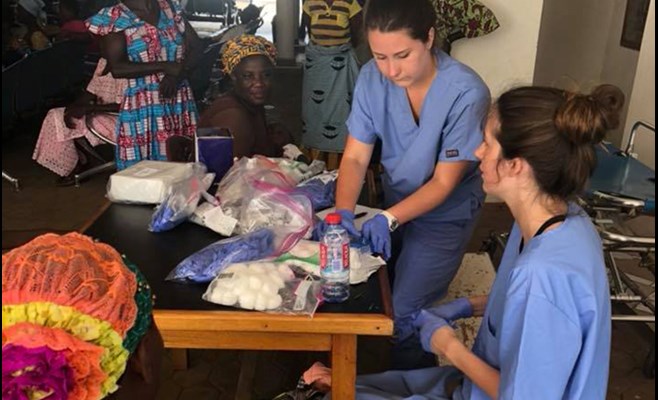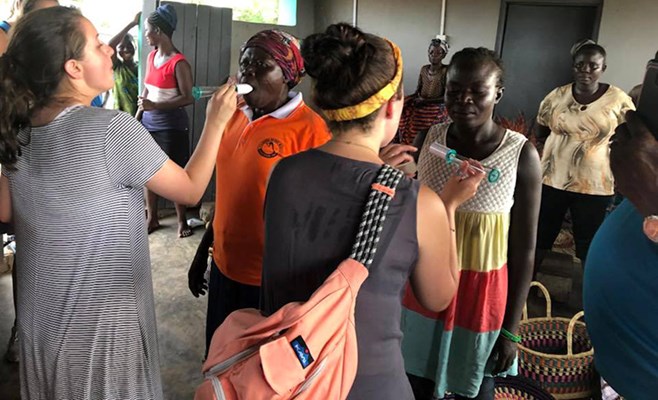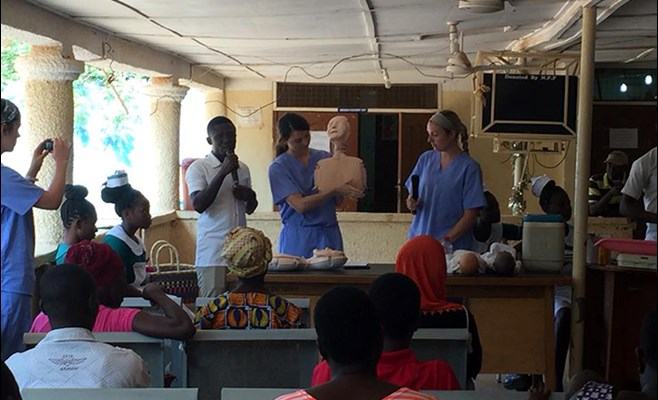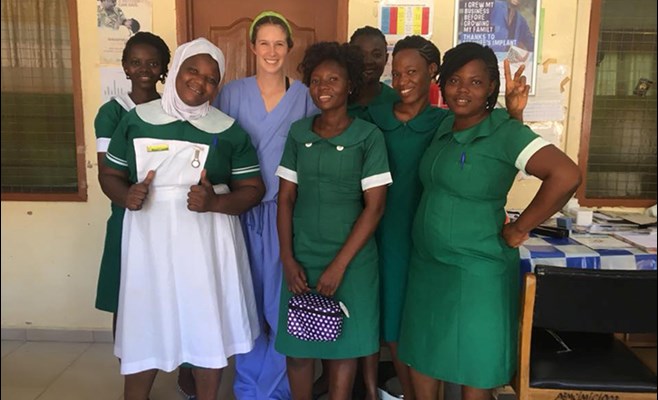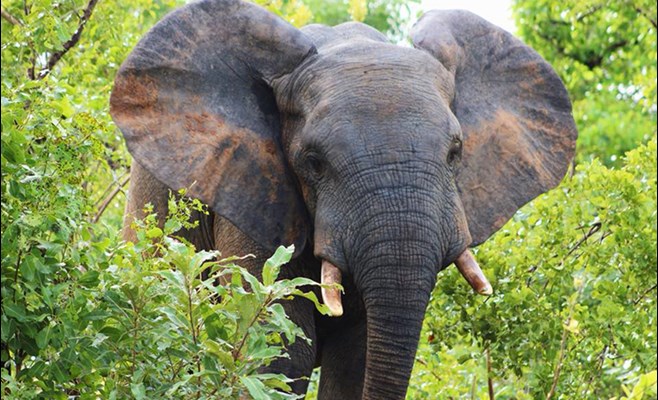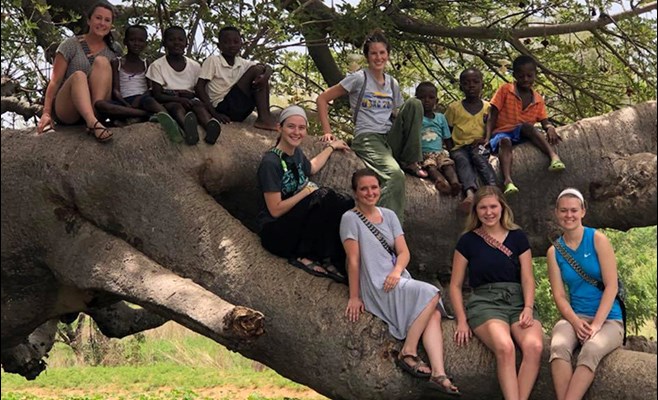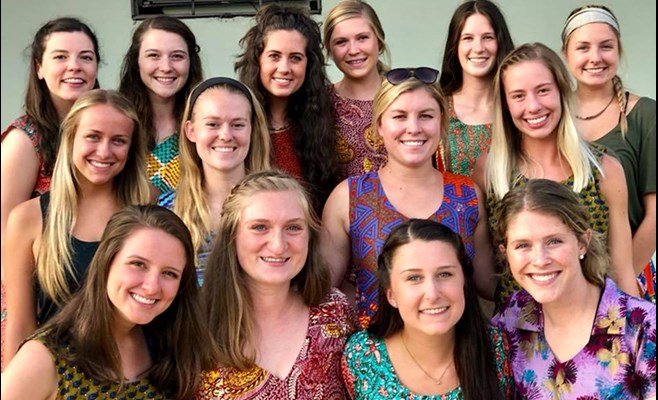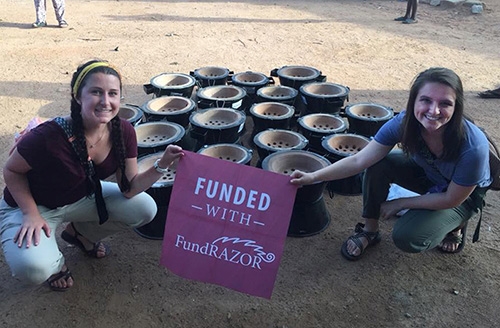
When women in Ghana cook meals using a traditional cooking pot, the smoke produced can cause respiratory illness such as pneumonia, chronic obstructive pulmonary disease, and asthma, not only in the women, but also in their family members. Fourteen University of Arkansas nursing students demonstrated how to use ceramic coal pots on a recent study abroad trip to the African nation, while explaining to the women how dangerous breathing the smoke can be.
The service-learning trip was the second to Ghana for the Eleanor Mann School of Nursing. Carol Agana, an instructor of nursing, has traveled many times over the past 10 years to Ghana, where she has a home with her husband, John Agana, a Ghana native. Ann Lofton was the other nursing instructor on the trip with Agana.
Nicole Capdevila of Coppell, Texas, and Kristen Eldridge of Little Rock are seniors planning to graduate in December. It was the first study abroad trip for both. They said that, in addition to learning more about nursing, they learned about the culture and themselves.
"I would definitely say, yes, I would work in a third-world country," said Capdevila, who has traveled to several Latin American countries on mission trips. "I definitely want to go on mission trips and help out once I have a degree. That is a really awesome part of being a health-care professional — to go overseas and use your medical knowledge."
Some of the students collected data for honors research, and they taught area residents about blood pressure, rehydration, sickle cell, wound care and malaria prevention. They taught some of the health lessons at high schools. And, they provided anemia screenings. As part of the ceramic cooking pot demonstration, the students used peak flow meters to measure how well air moved out of the lungs of the women attending the demonstrations.
The students, with the help of the university's Annual Fund office, raised money through a FundRAZOR to buy 100 new ceramic coal pots to give to the village women. At the cooking-pot demonstrations, the women were attentive and eager to ask and answer questions, Capdevila said.
"You could tell there was a sense of urgency when they were listening to us," she said. "There was a hunger to know the information, not only for themselves, but for the whole family."
The ceramic pots use much less coal, produce less smoke and burn a long time, Eldridge explained. Respiratory illnesses can be fatal because the people don't have access to medicine, especially asthma, she said.
"We could have done this countless times and hundreds of women could have benefited, but it was a really good number to start with to see how they would respond," Eldridge said. "A lot of them had heard about this type of pot but they are very expensive and they couldn't afford it."
Many of the women, especially the older ones, had not been able to attend school and did not speak English.
"We used translators and I had never taught anybody with a translator," Eldridge said. "We learned to communicate with body and facial expressions and sounds, too."
The students spent two week in clinics rotating through the units.
It was hard seeing some of the patients suffer because facilities lacked resources, Capdevila said.
"We learned a lot about being inventive," she said. "The nurses and doctors make so much of what they have, it was awesome to see. They were really willing to teach us how they do what they do and why."
Capdevila plans to work in the Charleston, South Carolina, area after graduation, either in the emergency room or obstetrics unit. Eldridge has a job in the cardiology unit at Washington Regional Medical Center in Fayetteville. During their rotation in a maternity ward in Ghana, they helped deliver a baby by Caesarean section.
"The mother was so sweet," Eldridge said. "She named the baby after us — Nicole Kristen."
The group encountered some wildlife including elephants and crocodiles and did some sight-seeing and shopping. They visited a castle where the Portuguese and Dutch exported natives, selling them into slavery. Pictures are posted on a public Facebook group.
Topics
Contacts
Heidi S. Wells, director of communications
College of Education and Health Professions
479-575-3138,
